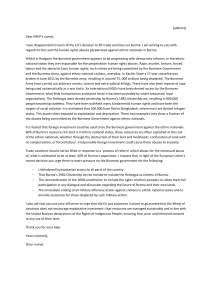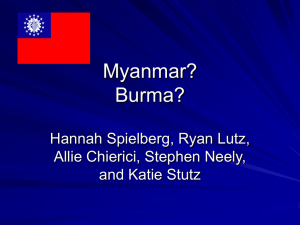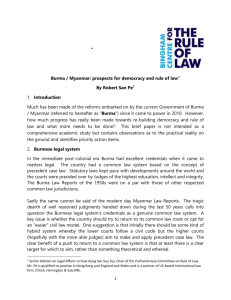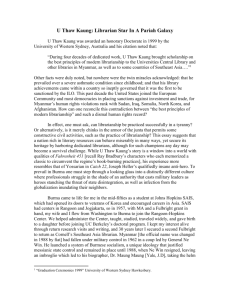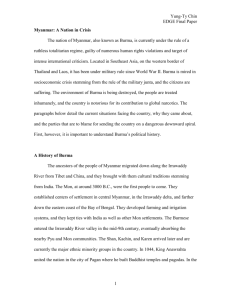Myanmar Literature Project: Nagani Book Club Investigation
advertisement
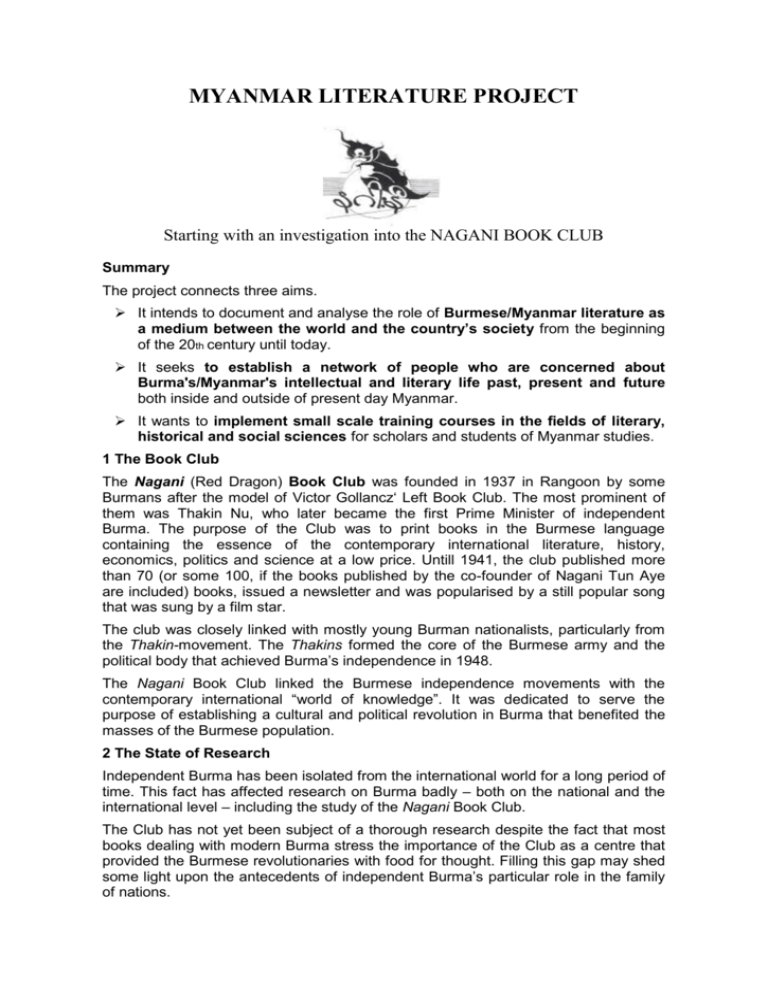
MYANMAR LITERATURE PROJECT Starting with an investigation into the NAGANI BOOK CLUB Summary The project connects three aims. It intends to document and analyse the role of Burmese/Myanmar literature as a medium between the world and the country’s society from the beginning of the 20th century until today. It seeks to establish a network of people who are concerned about Burma's/Myanmar's intellectual and literary life past, present and future both inside and outside of present day Myanmar. It wants to implement small scale training courses in the fields of literary, historical and social sciences for scholars and students of Myanmar studies. 1 The Book Club The Nagani (Red Dragon) Book Club was founded in 1937 in Rangoon by some Burmans after the model of Victor Gollancz‘ Left Book Club. The most prominent of them was Thakin Nu, who later became the first Prime Minister of independent Burma. The purpose of the Club was to print books in the Burmese language containing the essence of the contemporary international literature, history, economics, politics and science at a low price. Untill 1941, the club published more than 70 (or some 100, if the books published by the co-founder of Nagani Tun Aye are included) books, issued a newsletter and was popularised by a still popular song that was sung by a film star. The club was closely linked with mostly young Burman nationalists, particularly from the Thakin-movement. The Thakins formed the core of the Burmese army and the political body that achieved Burma’s independence in 1948. The Nagani Book Club linked the Burmese independence movements with the contemporary international “world of knowledge”. It was dedicated to serve the purpose of establishing a cultural and political revolution in Burma that benefited the masses of the Burmese population. 2 The State of Research Independent Burma has been isolated from the international world for a long period of time. This fact has affected research on Burma badly – both on the national and the international level – including the study of the Nagani Book Club. The Club has not yet been subject of a thorough research despite the fact that most books dealing with modern Burma stress the importance of the Club as a centre that provided the Burmese revolutionaries with food for thought. Filling this gap may shed some light upon the antecedents of independent Burma’s particular role in the family of nations. The Nagani Book Club was founded at a crucial period of Burma’s struggle for independence between the introduction of a constitution for Burma as a distinct part of the British Empire separated from British India, which came into effect in April 1937, and the outbreak of the war in Europe in September 1939. The establishment of the Club lies on the intersection of two lines of tradition. With the foundation of the Club, the demand for abolishing and replacing the British “slave education” was taken up, a demand that formed a red thread of Burma’s independence movements since the end of the 19th century. On the other hand, the Club by familiarising its readers with current international developments, knowledge and literature placed Burma into an international context and took up the demand of the British administrators that the Burmese had to be educated and Burma had to be modernised as a prerequisite to the country's independence. Thus, it can be expected that the study of the Nagani Book Club, its origins, its impact on the making of independent Burma and its role as a symbol of Burma's struggle for independence until today will contribute to a better understanding of Burma’s political culture before and after the re-gaining of independence in 1948. 3 The Project’s History The project was implemented in January 2005 with the financial assistance of the Friedrich-Ebert-Foundation. People inside and outside Myanmar were asked to write book reports on the books published by Nagani with the intention to publish them in English. The response was great. Up to today, some 130 reports on more than 70 books published (out of a total number of 100) have been submitted by 70 contributors. More reports are promised. That opens the prospect of gaining a satisfactory overview about the publication of the Club as well as an insight into the way Burmese people concerned with the intellectual and literary heritage of the country are reporting on the publications, interpreting as well as assessing the legacy of the Book Club. At the Burma Studies Conference in Singapore (July 13-15, 2006) the project together with some first reflections of the role of literature for the development of Burmese society was presented by participants in the project from Myanmar. 4 Publications Southeast Asian Studies at the University of Passau publishes a series of working papers containing book reports as well as related material and contributions on the role of literature in the process of nation building in Burma/Myanmar. It is intended to publish each book report together with a short commentary written by an “interested outsider” and other material on the reception history of the books and their respective topic in order to make clear that the project aims at an international dialogue on Burma's past as well as the prospects of Myanmar's future. Some of the books have been completely translated into English such as Ba Khaing’s Political History of Myanma, Thakin Soe’s Socialism, a Dictionary of Political Terms compiled by Nu and Hla Pe Ba, Hein’s Students’ Revolution and Thein Pe’s Indo-Burmese Riot and the. Be Hein’s and Thein Pe’s booklet provide the Burmese text together with the translation. For a complete list of papers already published, see below. The next papers will cover material on books on Germany, translations of Sun Yat Sen’s “Three Principles of the People” and the plays published by the book clubs. 5 Next Steps In early 2011, a conference is planned to be held in Chiang Mai or Yangon on the topic of “Burmese Perceptions of Burmese Economics”. As a basis for the conference, a textbook containing material written in Myanmar is presently compiled. 6 Call for Participants The project's success depended and still depends on the readiness of people to take interest and participate in it. Some books still need to be reviewed, many book reports need to be translated from Burmese into English and a lot of reports have to be commented upon. Anybody interested in the subject is invited to participate in the project by writing comments and reviews on the contents of the volumes already published; contributing essays on Burmese/Myanmar literature as a medium between the international world and Burmese society; providing material, which sheds more light on the Nagani Book Club, its context and impact on Burmese intellectual and literary life; offering assistance as translator, commentator, or assistant editor. For more information, please contact: Dr. Hans-Bernd Zöllner Universities of Passau and Hamburg Phone: +49-40-8317961 Email: habezett@t-online.de Last Update: January 2010

